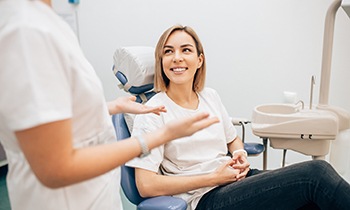
Accidents happen, and we understand that you can’t always plan for them. From getting a raging toothache out of nowhere to chipping a tooth during a sports game, we’ve planned for just about any situation. When you call us with a dental emergency, we’ll do everything in our power to see you the same day you call. In the meantime, one of our knowledgeable staff members will walk you through some basic first aid until you can come to see us. Contact us if you have a dental emergency.

When you experience a dental emergency, you should call Dr. Molzahn's office first and foremost. Our team will work quickly to get you the prompt relief you deserve. However, we’ve provided some basic tips below to help you handle your situation until you make it to our office.

A lot of factors can go into deciding how much treatment for dental emergencies costs. It might range from a simple prescription of antibiotics to more serious procedures like tooth extraction. Whatever the problem, our team will help you figure out your financial options and maximize your insurance benefits, so you don’t pay a cent more than you need to.
If you think you’re experiencing a dental emergency, don’t hesitate to contact your emergency dentist in Worthington so we can get your smile back on the right track on the same day you call.

You can’t always tell when an emergency is going to happen, but you can do a few things to lower their chances of occurring. Those things include:

Dr. Molzahn wants to do everything she can to not only help you if you are experiencing a dental emergency, but educate you on the best ways to manage it prior to your arrival to the office. The better you understand what’s happening inside your mouth during a dental emergency, the more effectively you can handle dental emergencies if they happen to you or a family member. Below, you can find the most common questions our office has received regarding dental emergencies for your convenience.
A chipped tooth should still warrant a visit to our office no matter what as damaged teeth can easily break down further if they are already fractured. However, there are instances where a tooth is only cosmetically chipped, meaning that it can be restored at a later date rather than right away. If you feel any pain or discomfort whatsoever after your tooth has been chipped or fractured, call our office. Furthermore, you should call us if the tooth is fractured and the crack extends below the gum line, even if there is no pain.
If you are a parent who has many active children or you simply care about being prepared at all times for medical and dental emergencies alike, it’s always a good idea to have the right medical supplies available in case a dental emergency does occur. A few items you’ll want to have in your dental emergency kit include but are not limited to nitrile gloves, dental cement, temporary dental filling, cotton balls, gauze pads, oral swabs, hydrogen peroxide, salt, dental mirrors, and acetaminophen.
While many dental emergencies can be handled by a dentist, there are some circumstances where it may be better to visit the emergency room first, then our office. For example, if you are experiencing severe oral bleeding that does not stop or you have a broken jaw, an emergency room visit would be more appropriate. Once you have stabilized, call our office and we’ll do our best to get you seen as soon as possible.
Unless you’re a child whose baby teeth are still waiting to fall out, there is no reason why your tooth should be loose. Whether it’s your natural tooth or a dental implant, a loose tooth is a sign of either bone loss as a result of gum disease or because of recent physical trauma. Regardless of the cause, you should call our office right away to get your tooth looked at more closely.
Preventive Dentistry Restorative Dentistry Cosmetic Dentistry Dental Implants Sleep Apnea Therapy View All Our Services